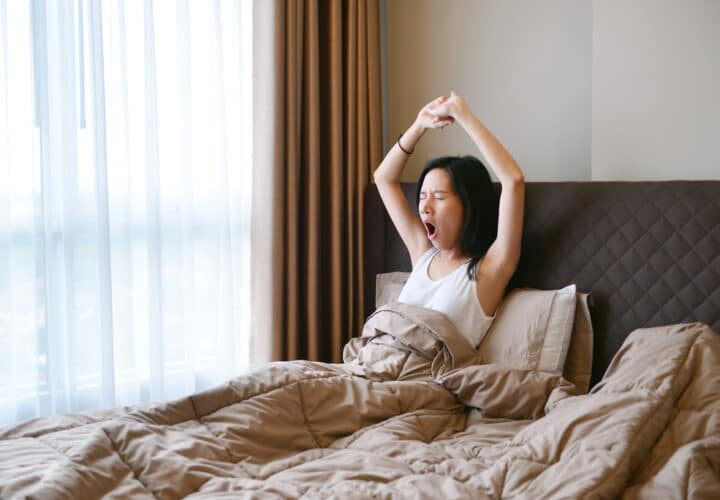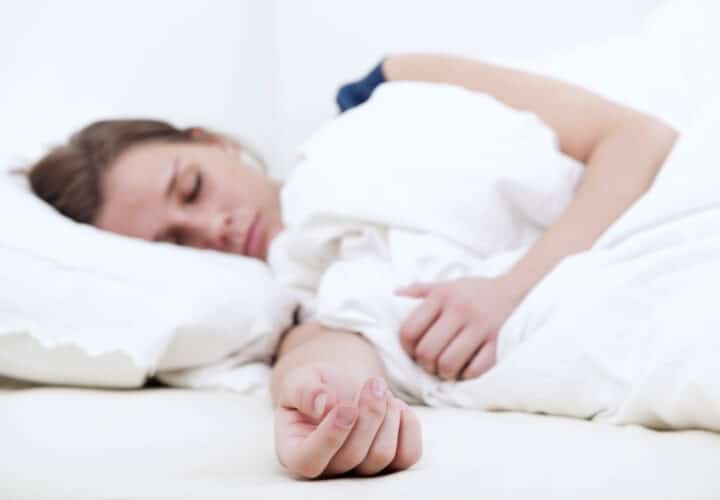A new study from the Mayo Clinic shows that people with sleep apnea are more likely to have higher levels of the protein tau, a biomarker for Alzheimer’s disease, in their brains.
About 22 million people in America have sleep apnea, which causes a disruption of breathing during sleep. And many people who have sleep apnea don’t know they have it—but waking up tired and loud snoring are two of the most common signs. Other signs include falling asleep during daily activities like driving, sitting, watching T.V. and reading, along with waking up with a headache or gasping for breath during sleep. It’s a serious condition that can raise the risk of depression, hypertension, heart disease and Type 2 diabetes—and now, research is confirming that it also increases the risk for Alzheimer’s.
“A person normally has fewer than five episodes of apnea per hour during sleep,” said study author Diego Z. Carvalho, MD, of the Mayo Clinic in Rochester, Minn., and a member of the American Academy of Neurology. “Bed partners are more likely to notice these episodes when people stop breathing several times per hour during sleep, raising concern for obstructive sleep apnea. Recent research has linked sleep apnea to an increased risk of dementia, so our study sought to investigate whether witnessed apneas during sleep may be linked to tau protein deposition in the brain.”
Researchers from the Mayo Clinic in Rochester, Minn. asked the bed partners of 228 people over the age of 65 who did not have cognitive problems if they had ever witnessed their partner stop breathing during sleep. They then gave PET scans to the 288 participants to look for tau, a toxic protein that forms into tangles within neurons in the brains of Alzheimer’s patients and keeps neurons from communicating with each other, robbing people of the ability to think. They looked for the protein in the entorhinal cortex area of the brain, an area in the temporal lobe that typically accumulates more tau than other regions of the brain.
Forty-three people in the study, 15 percent of the group, were identified as having sleep apnea. When the researchers compared their scans to the scans of people who were not observed to have sleep apnea, they saw that tau levels were 4.5 percent higher in people with sleep apnea. The difference remained when they controlled for other factors that might raise tau, like age, education, cardiovascular risk factor and other sleep issues.
“Our research results raise the possibility that sleep apnea affects tau accumulation,” said Carvalho. “But it’s also possible that higher levels of tau in other regions may predispose a person to sleep apnea, so longer studies are now needed to solve this chicken and egg problem.”
In other words: Did the sleep apnea cause the tau accumulation, or did the tau accumulation trigger sleep apnea? The full study will be released at the American Academy of Neurology’s 71st Annual Meeting in Philadelphia, May 4 to 10, 2019.
Past studies have shown that disrupted sleep is a sign that Alzheimer’s might be brewing. We know that sleep is necessary for the brain to perform a “deep clean” that removes toxins that occur during cellular activity. We’ve also seen evidence that disrupted sleep can dramatically raise levels of beta-amyloid, the other biomarker of Alzheimer’s, in the brain—and that difference can be seen in the brain decades before symptoms like memory loss and confusion begin.
Sleep apnea sets off a list of problems that have a domino effect on health. When air is obstructed, there is not enough oxygen flow to the brain. That sets off the sympathetic nervous system, which causes a person’s heart rate, blood pressure and adrenaline to climb. All of those set the stage for the aforementioned afflictions.
The good news: There are many easy, effective treatments for sleep apnea. The American Sleep Apnea Organization has developed four online tests that can help determine if a visit to a sleep clinic might be in order.
[ Next: A Solution for a Dementia Patient’s Sleeping Problems ]




My wife is in stage 6 of Alzheimer’s. She does not have sleep apnea, but she has become a very loud snorer since stage 5. She snores like this about 2/3’s of the night. She’s like this probably 5 out of 7 nights, even when she is napping during the day.